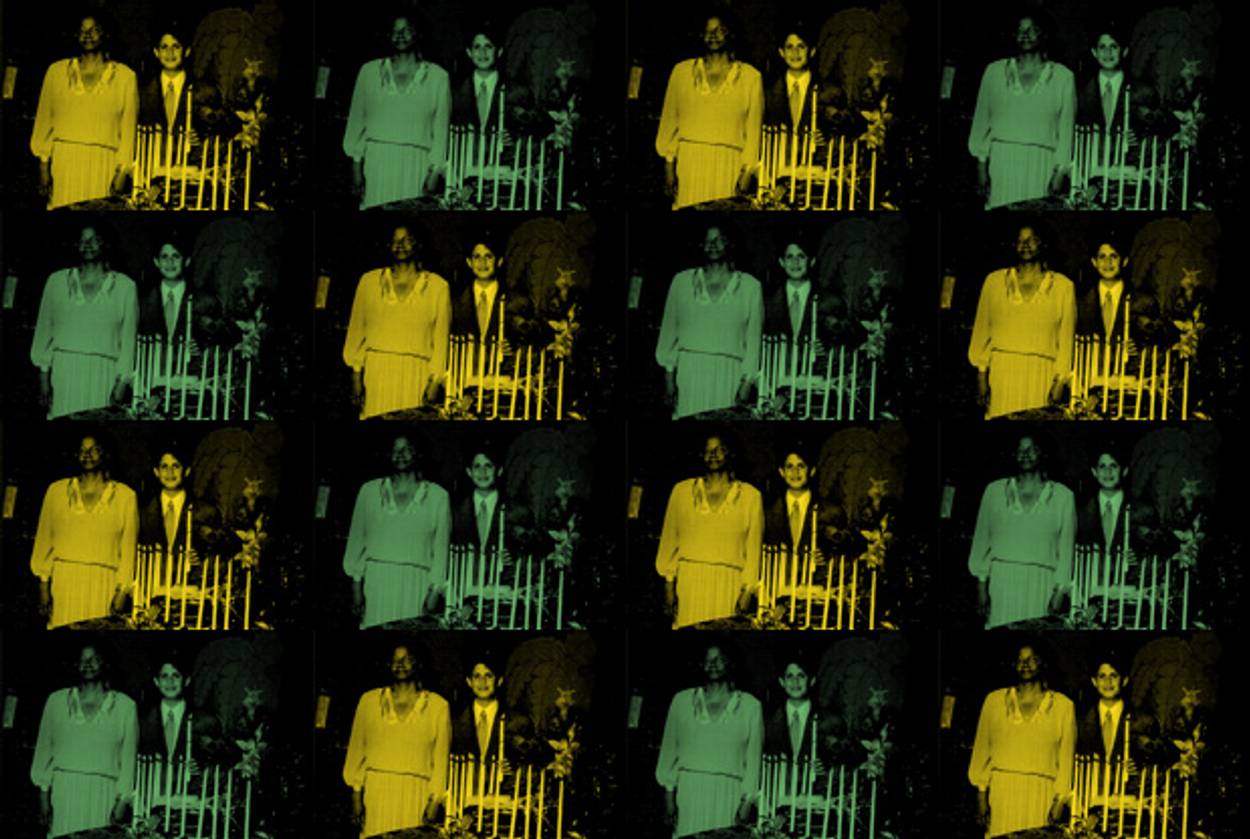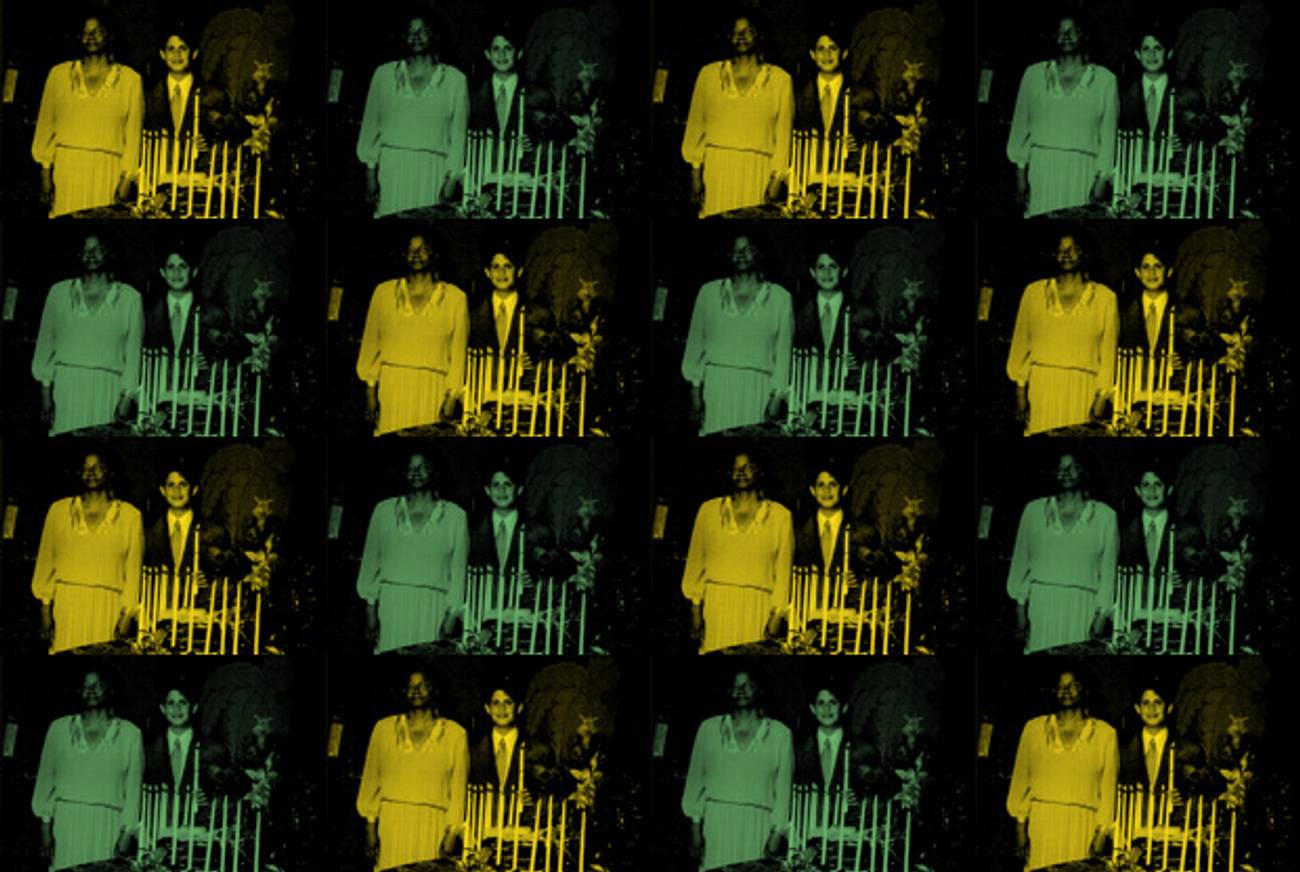What My Nanny Left Me
How did a Jewish boy from New Jersey end up speaking with a Jamaican accent? It’s an enduring inheritance from a woman who raised me.




It was a supreme role reversal, as I stood next to my former nanny’s bed in Newark’s Beth Israel Hospital, feeding her Kozy-Shack rice pudding and wiping the residue from her lips.
No longer a boy with a neat auburn bowl-cut, I was now an unruly-haired twenty-something with a thick Semitic beard. Looking like an ancient Levite, I stood in sharp contrast to the others in Dezna’s hospital room—the Caribbean churchwomen from her Seventh Day Adventist congregation who sang hymns, held my hands, told me about Jesus, and gave me a book about the afterlife. Though I appeared a distinct outsider, I knew I could reveal our surprising shared identity simply by opening my mouth. Because unlike most Jewish boys from New Jersey, I have a Jamaican accent.
I am often faced with guffaws of incredulity, or pshaws of dismissal, when I explain that my unusual accent doesn’t reflect the influence of my native Princeton or the musicality of Torah tropes, but rather the sing-song lilt of the West Indies, the hum-drum of Montego Bay, the modulated patois of reggaeton. But it’s true, and it all started with Dezna, the Jamaican woman who spent the first 13 years of my life with me.
***
Throughout my neurotic, book-stuffed youth, I was terrified at bedtime, when the absence of light makes one vulnerable to bandits and dybbuks. My family certainly had no conception of the golem crisis in my bedroom in the early ’90s, so to cope with my paranoia, I stayed close to Dezna at night.
Dezna was my hero, especially on nights my parents went out, when the fear was at its peak. My parents would go to dinner at the Blumenfelds, see a movie with the Walkers, or grab some nosh with the Andersons. The door would slam, the Saab would pull out of Hale Drive, and my sister, Nicole, would start crying. I would start washing my hands to cope with the stress of abandonment, until Dezna would eliminate my anxieties with various invitations pronounced in her mellifluous Jamaican accent: “Come yah dungstairs, Ross-mon, let’s get dez-ert,” or “Djeopardy stahts soon.”
And with my washed-out knuckles on the verge of bleeding, I would descend to the kitchen—my ears overflowing with her words’ intoxicating rhythm, dulcet rum to inebriate my auditory nerves.
After dessert—I always chose Chips Ahoy Deluxe, because I thought it sounded fancy—Dezna would put on her hair curlers, and Nicole and I would sit Indian-style in front of the television in her room for Jeopardy at 7:00. In our little trinity, we slapped five when we secured Daily Doubles or won at Final Jeopardy. (Dezna knew an impressive amount of trivia.) Then came Wheel of Fortune; vowels were for sale, but in our Jamaican-influenced articulation, they were shortened, flattened, deepened. The three of us would shout: “C’mon, big money!” Dezna would solve the puzzles, and Nicole and I would lavish in the glory of our (somehow) collective victory—some two or three spins before the contestants on the tube. We were, after all, two precocious children growing up in an intellectually pretentious town with a woman of profound knowledge.
After the shows, we would make some complaint about brushing our teeth before preparing for bed at 8:30. But it was an anatomical impossibility to speak out against Dezna’s honeyed voice, and we would eventually obey her rules and squeeze our toothpaste from the bottom, “brush and flush,” and go to bed in Nicole’s room. I spent every night my parents went out in the extra twin bed in my sister’s room. It mattered not that Nicole’s room, adorned with pink ruffles and ornately frilled shams, better suited the usual girly suspects of her sleepovers—I was comfortable all the same there in the uterine warmth of down and silk.
Dezna, dimming the lights to make the pink ruffles and chiffon a pastel Creamsicle, would pray. This wasn’t the sort of prayer we found in Hebrew school where we could race through mumbling, without a full conception of the gravitas. This prayer was more about profound wishing. Dezna would pray for the welfare of our parents, the health and happiness of her eight children (seven in Montego Bay, one in the other Jamaica, in Queens), the sweet dreams of Nicole and Ross. Just as Dezna would look on with absolute, if amused, respect as we lit the Shabbes candles or sang before the menorah, Nicole and I, eyes closed, would hold hands with our nanny in a circle of reciprocal respect as she prayed: “Lord our Father, Jah in Heaven.”
***
In my youth, I spent many weekends and school vacations working in my father’s hardware store in Princeton where I helped hoity-toity Nobel laureates in literature find the correct screw, and counted out incorrect change to tenured Princeton math professors who had proven Fermat’s Last Theorem. As such, I was exposed to the most pretentious and academic of speech patterns: R’s that became H’s, throaty schwa E’s, nasal and diminutive A’s. Added to that, I had a Jewish merchant’s inflection, a gimmicky shtick to deflect hagglers. (At 7 years old, I could not be talked down in price on a Weber grill.) These influences, to be sure, laid the foundation of my accent, but the decorations of its baroque tendencies, the savvy of its enunciation, come from my extended time with Dezna.
My consonants are clear, if over-pronounced, with T and D ticking in tandem and spitting like the greasy hands of a grandfather clock. Flat vowels, like deep plunks of rocks in Caribbean coves, irrigate my voice.
Dezna was my closest childhood friend, and moments we spent over cereal and tea, the walk to the bus stop on spring mornings, the games we invented with tennis balls and the geometric bends of my house’s shingled roof, allowed her to pour into my ear the West Indian time signature, the syntactic steel drum. From her taunting calls at wrestlers (we got into WWF together, favoring the Undertaker and under-the-radar uber-Jew Randy Savage), tempered with afternoon warnings directed at the television during The Young and the Restless (“Dohn go in der, girl?”), I have retained, in the most instinctive elements of my speech, the diminished final T, the rhythmic jump, the last word of a statement hurling up interrogatively toward an unnecessary question mark. We share, by osmosis, this sing-song accent, harmonized in a sort of Haftorah-trope progression, incanted in pedal-held beats. The accent is not merely Dezna’s fault, but her phylogenic begetting, the prolongation of her most amazing feature.
My Jamaican way of speaking is perhaps, strictly speaking, less an accent than intonation or rhythm. If you’d listened to Dezna and to me, our lilts would sound the same, our reduced O’s identical. She kept diphthongs beautifully closed and flat, saying “cow” or “now” with an almost Irish brogue. Instead of “Ross and I,” she would say “Ruhss and m’self.” “This thing” became “Dis ting.” At bathtime, “dirty” was somehow “dutty” in our Jam-Down speech. “Somebody” was “samdi,” and “you all” became “uno.” Dezna also colored her speech with incorrect colloquialisms to spice up her syntax. My own speech is moistened, colored, more muscular because of the variety of sounds to which I was exposed.
In fact, she exposed me to more than language. My whole upbringing spliced together a Jamaican cultural immersion alongside my American Jewish upbringing; with all the johnnycake dumplings and ginger beer and salted codfish she fed us, it was almost Study Abroad Montego Bay. But like any study program, it had to end. In 1999, I was bar mitzvahed—no longer a child, no longer in need of a nanny—and Dezna moved out.
Later, when I lived for a year in Crown Heights, that smattering of Orthodox Jews and Caribbean refugees, I felt the Brooklyn neighborhood was ideal for my binary character. Though I consented to the be-payosed lulav squad who tracked me down and made me shake to reaffirm God’s existence, though I attended a service at the Chabad-Lubavitch mecca at 770 Eastern Parkway and went to Shabbat dinners in the neighborhood, I found just as much connection eating jerk chicken at The Islands or from some random beef-patty joints. I moved seamlessly through Crown Heights. After all, my poufy Jew-fro, standing on end as if Kafka had gotten friendly with an electrical outlet, could have put me into either of two categories: New Age rabbi with a Samson complex, or reggae star extraordinaire.
Dezna and I remained in contact. When I spoke to her over the phone, a slight smile of pride appeared on my lips when I heard in our dialogue the clangor of a Jon Connu troupe, the syncopated Caribbean rhythms, the swished vowels of our One Love accent woven into our language.
And so it was terrifying to stand over her hospital bed in Newark, as I did the fall before last, and see my childhood savior supported through an IV feeding tube. Hard to call her name and have her not hear through some deep sleep, unable to voice any response. But that voice, the Jamaican voice that is my most prized asset when I greet the world, carries on her memory within me. It is the voice that sang Kaddish for Dezna when she died, and the one that maintains the fluidity, the Jewish-Jamaican encoding with which I so proudly make my pronunciations.
***
Like this article? Sign up for our Daily Digest to get Tablet Magazine’s new content in your inbox each morning.
Ross Kenneth Urken has published in the Wall Street Journal, the New York Times, New York Magazine, The Atlantic, The New Republic, and The Paris Review. He lives in Manhattan.
Ross Kenneth Urken has published in the Wall Street Journal, the New York Times, New York Magazine, The Atlantic, The New Republic, and The Paris Review. He lives in Manhattan.